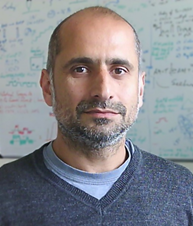In 2019, Dr Neil Kad was the recipient of an APEX award delivered jointly by the Academy, the Royal Society and the British Academy. The APEX awards support interdisciplinary research that benefits wider society, providing up to £100,000 for independent researchers to collaborate with partners from different disciplines across the sciences, engineering, social sciences and humanities.
Dr Neil Kad is a Reader in Molecular Biophysics at the University of Kent where his main teaching responsibility is to manage the 200 School of Biosciences’ undergraduate’s final year projects. He has teamed up with Dr Amanda Wright and Dr Richard Cousins, at the University of Nottingham’s Nanoscale and Microscale Research Centre (nmRC), to develop nano-confinement tools to study DNA repair.
In a continuous battle to maintain the integrity of the body’s genomes, motile enzymes work to repair damage caused by DNA. Without this mending process, cells would die or transform into cancerous tumours. However, it is extremely difficult to image protein complexes at work.
To view one molecule at a time requires high levels of dilution but at low concentrations these protein complexes fall apart. Dr Kad and his colleagues are using a method of high spatial confinement which involves placing DNA into extremely small channels thus reducing the required volume needed.
Working with the nmRC, Dr Kad has begun to create viable devices using electron beam lithography systems. These instruments will enable the researchers to successfully squeeze DNA into the required nano-channels.
The researchers’ mission is to create a tool that other scientists can use more easily and economically. If this can be done, then it would be possible to observe DNA repair complexes. Understanding how these work would offer new avenues for future treatments of cancer and ageing.
Find out about current research opportunities and fellowships.

